Imagine walking into a Swiss supermarket for the first time.
You think it’ll be a quick and simple errand, but soon you’re second-guessing what to do, where to find things, and how everything works.
It doesn’t take long to realize that shopping here has its own rules, and you have no idea what they are!
So, from a long-term local like me, here are the most important things you need to know about Swiss supermarkets before you head out for groceries.
Practicalities
Let’s start with some basic, but essential things you are probably unaware of, and can definitely trip you up!
Bring Your Own Bags (Or Buy Them $$)
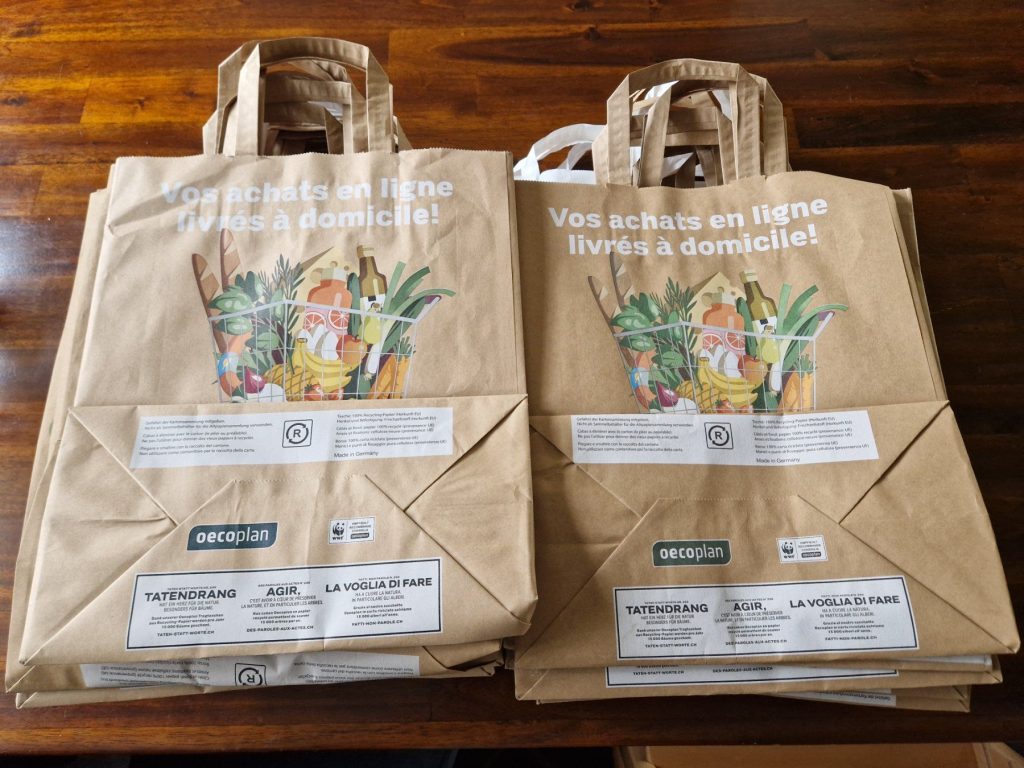
Unlike in some countries, Swiss supermarkets do not provide free bags.
If you forget to bring a reusable one, you’ll need to purchase a plastic or paper bag at checkout, usually costing CHF 0.05–0.50. I personally go for the paper bags as they are bigger, more durable, and can be used again.
Locals always carry sturdy reusable bags or folding totes and avoid having to buy bags altogether. Yes, environmental concerns and recycling often play a big part in some parts of people’s lives here, like with public transport vs. driving.
Packing Your Own Groceries
If you are expecting baggers in Switzerland, you are in for a bit of a shock.
You have to pack your own groceries both quickly and efficiently.
IMPORTANT: Don’t wait quietly and patiently while the checkout attendant scans your stuff, get to the end of the checkout and start packing ASAP!
They scan sometimes reasonably fast and do not wait for you to pack. In some supermarkets, they have two packing areas, so you have a little time (sometimes), but only until the next customer. Then you will feel the pressure to pack faster! So, get started as soon as possible.
- Grab your paper bags and place them at the top/start of your items on the belt, so you get those scanned first (paid for) and you can use them right away
- Go to the end and open them ready to start packing (heavy things first, salad, eggs, smashables aside so you can put them on top – I am assuming you don’t pack often :>)
- And watch for when they are done, as you have to come back to pay, even if you are not done packing yet :>
If you can’t get your packing done fast enough, don’t sweat it, just avoid eye contact :>
Weighing Fruits and Vegetables
One of the most confusing parts of Swiss supermarkets for newcomers is weighing produce yourself.
Instead of the cashier handling it, you place items on a scale in the produce section, press the button with the correct picture or name, and attach the printed sticker to your bag.
👉👉 Here are some pictures and descriptions to help you understand the process
- Figure out if the items need weighing (you will see a number shown, like in the image below). TIP: Some exceptions include cucumbers, courgettes/zucchinis, limes/lemons, avocados, etc.
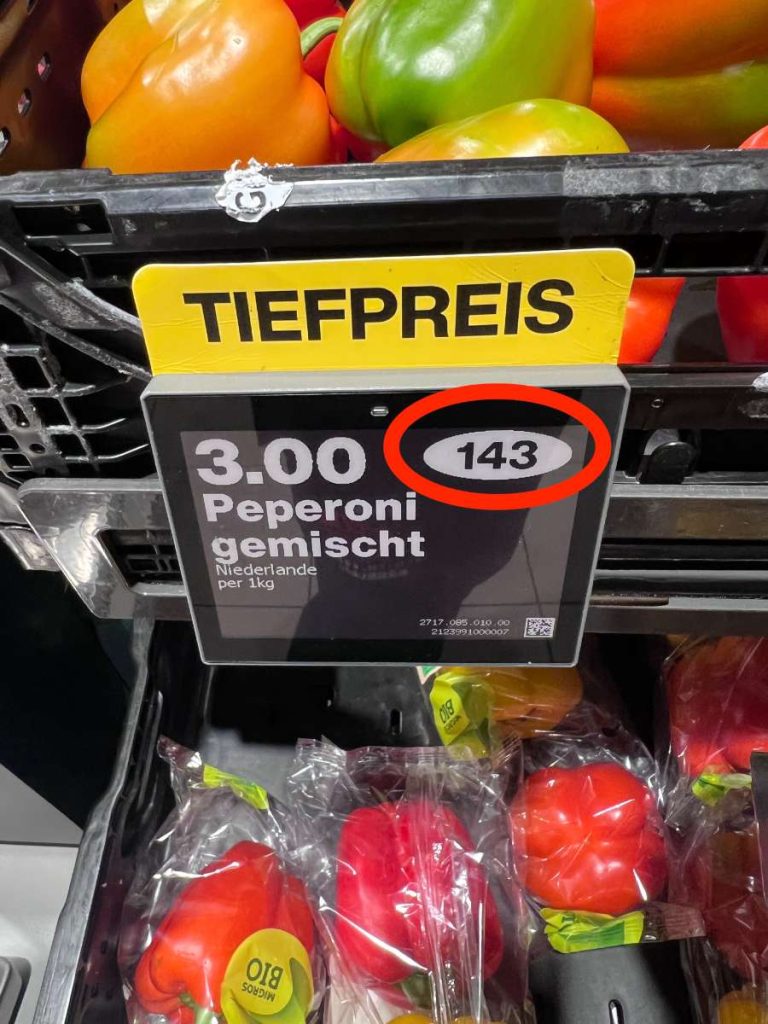
If there is no number, it is a “per item” cost basis and DOES NOT need weighing.
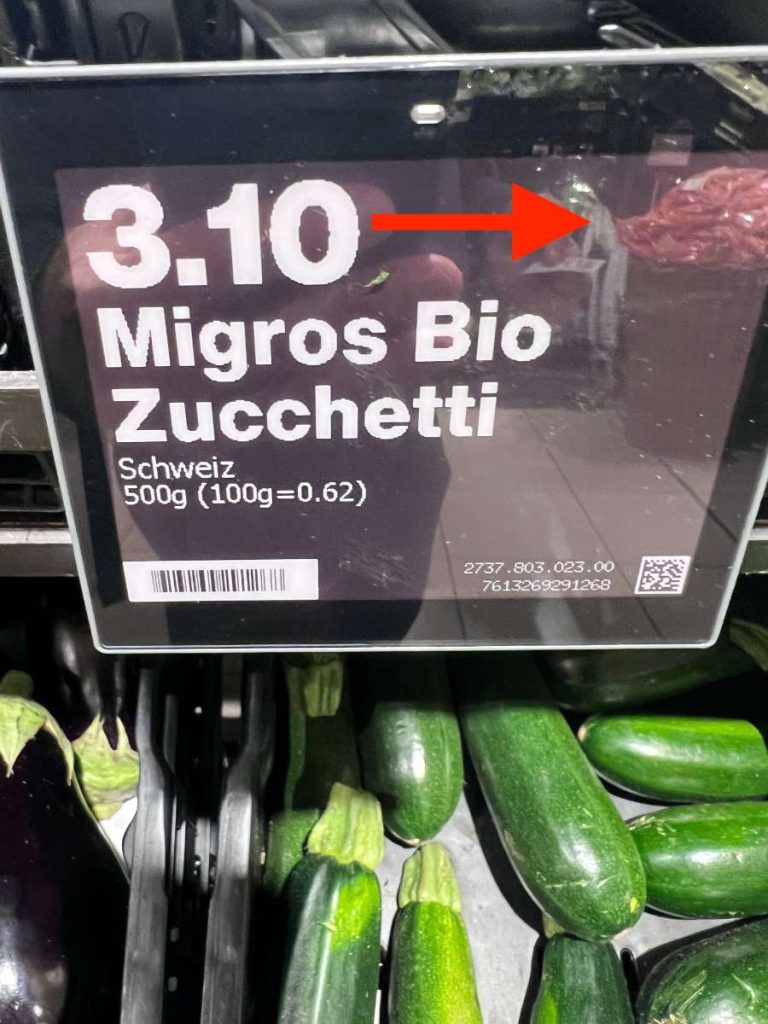
2. Now you have to weigh your item
- First, choose if you have put it in a bag (plastic bag provided, or your own) – this is a recent addition, the default is NO BAG (which I use a lot, but most of you won’t), the second choice is usually the provided plastic bags
- Now type in the number – the system weighs and prints the price with a scannable code on a sticker
- Click OK
- Stick the generated label on the bag or your item (but don’t lose it)
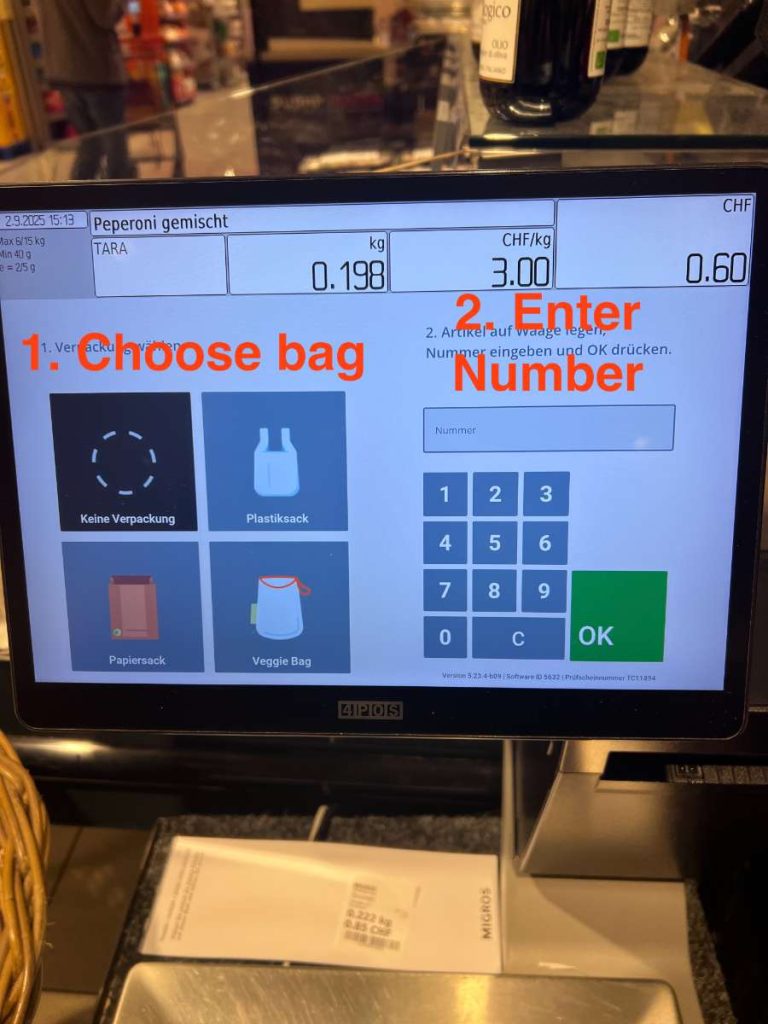
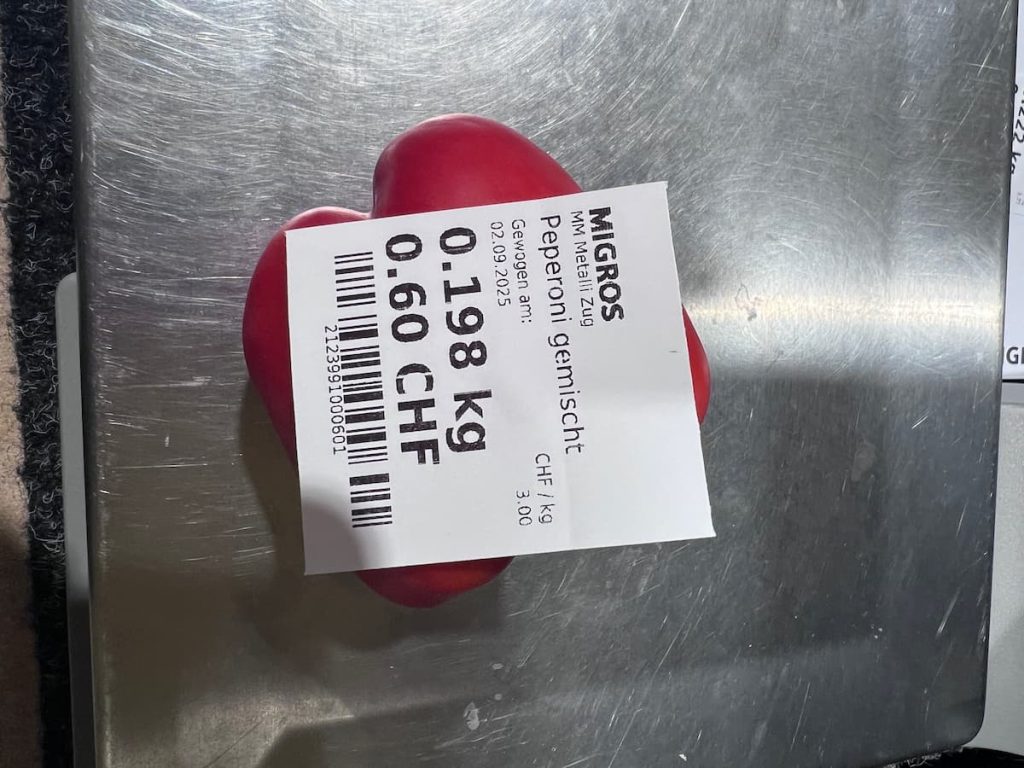
Shopping Carts and Baskets
Supermarkets have large trolleys/carts and small handheld baskets available for you to use.
To use a trolley, insert a CHF 1 or CHF 2 coin (or a plastic token or Euro coins), which is released when you return it. So, this is another reason to have some cash when you are here, even though many will tell you that you don’t need any.
This system keeps carts tidy and ensures people bring them back after shopping.
👉👉 How Much Cash Do You Need in Switzerland?
Opening Hours
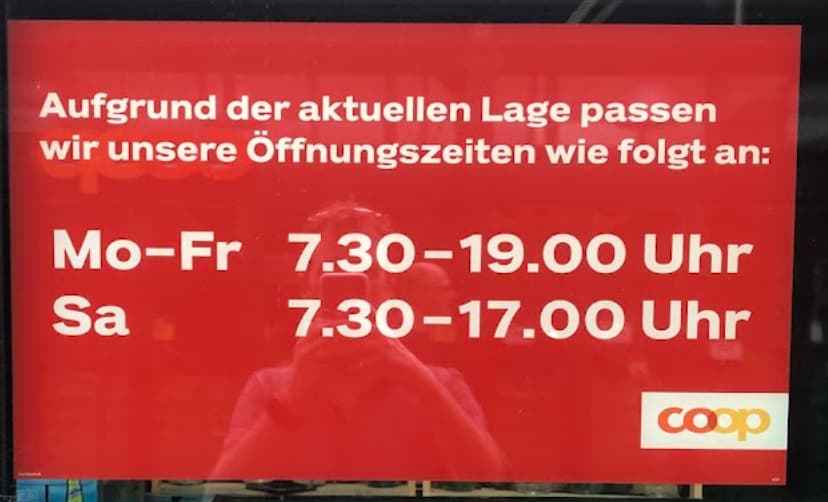
Supermarket schedules in Switzerland are stricter than many visitors expect.
Most close by 6:30 or 7:00 pm on weekdays, and on Saturdays they often shut as early as 5:00 or 6:00 pm. (NOTE: Switzerland uses military time BTW)
Nearly everything is closed on Sundays except for train stations and airport shops. In smaller villages, some shops even close for a midday lunch break – mainly because the kids come home from school to eat.
If you are lucky, some supermarkets open a little earlier, but be sure to check on their doors or use Google Maps to find the opening times; they are usually quite accurate.
Sunday Shopping Alternatives
If you get stuck on a Sunday and need to do some urgent grocery shopping, here are some options:
- Cities & big town – supermarkets in train stations (and airports) are allowed to open on Sundays
- Convenience stores – gas/petrol station stores are often very well stocked with a bit of everything and you should be able to assemble a few meals with what they have. Or just grab some junk food!
👉👉 Download the MOST important APPS for your Swiss Trip
Self-Checkout

Self-checkout machines are becoming very popular in larger Migros and Coop stores these days. If you want a quicker experience, this is the way to go.
They are far more convenient but typically default to the local language, German, French, or Italian, so expect a little guesswork if you don’t speak any of those.
The biggest challenge is finding the fresh produce (non-weighed) and small baked goods on the screens, as you have to do it manually. So skip this if you are not confident.
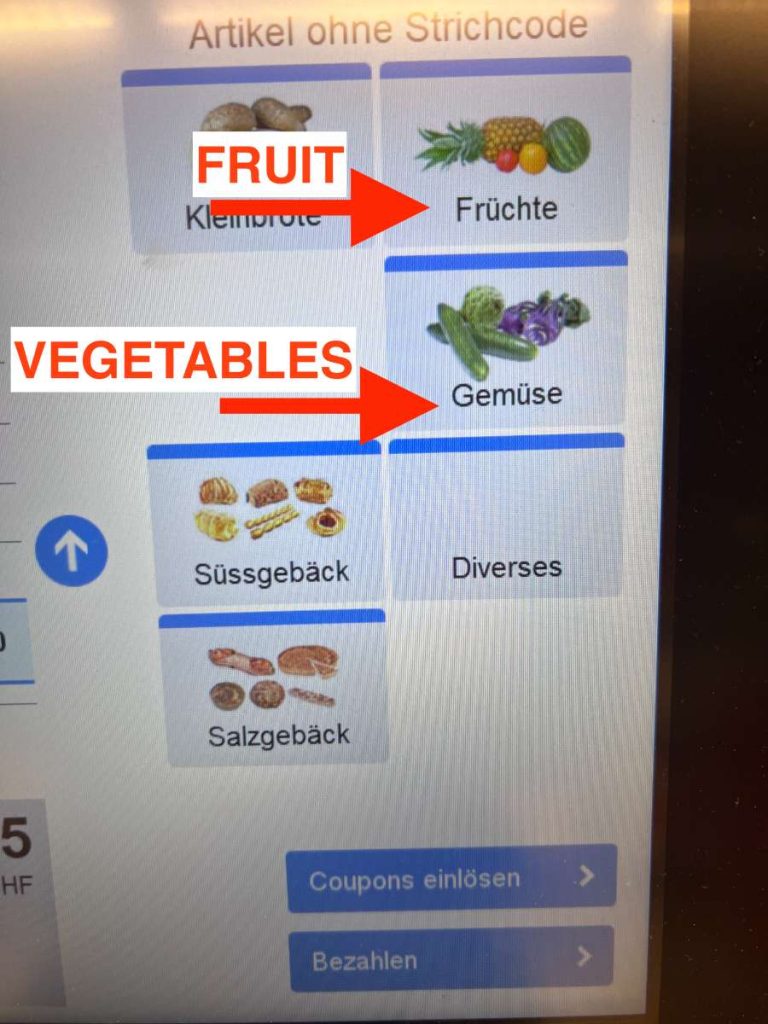
Both cash and cards are usually accepted, making them a quick option for small shops. But watch out for which machines accept which – as cards are favored.
NOTE: Also be aware that bags are NOT FREE. So you have to scan them as well – 5c for plastic, around 30+ cents for the paper ones (I recommend those for bigger loads and re-use for your next visit – I have a cupboard full of them!)
Want To Save This For Later?
Paying
When it comes time to pay, there are a few things to be aware of in Swiss supermarkets.
- Cards: Credit, Debit and tap to pay are widely accepted, so you have little need for cash (AMEX is not as widely used)
- Cash: You DO NOT have to have cash in supermarkets (aside from the 1 or 2 CHF for the shopping cart) but you can use it if you wish
- Self-Checkout: Most of the time you can only use card (there are some exceptional ones that accept coins/notes)
Other random things: You will get asked for a loyalty card (which you likely won’t understand) by the checkout operator (Supercard in Coop) and perhaps if you want (punktli or Maerkli – which are stickers for things they give away of sell cheap). Just smile and shrug. :>
Bread

One of the best things about Swiss supermarket bread is that it is baked fresh throughout the day.
Locals often buy it daily instead of stocking up for the week. The only downside is that it goes stale quite quickly. My tip is to freeze it in slices (in a ziplock) or wrap it in a dish towel overnight to keep it much longer.
Choices range from simple white bread to regional favorites like Zopf, a braided bread traditionally eaten on Sundays, to more rustic and brown breads.
You can also get bread rolls and other baked goodies (like croissants) in the “grab it yourself” section. Just be aware there are tongs you “should” use (or get scorned at) to grab them.
NOTE: If you choose to go self-checkout: You have to find them on the screen under “suss” or “salzgebäck” (sweet or salty baked goods). So, if you are unsure, just go to the checkout :> They know their breads!
👉👉 What Tourists Get Wrong About Eating Out in Switzerland
Eggs
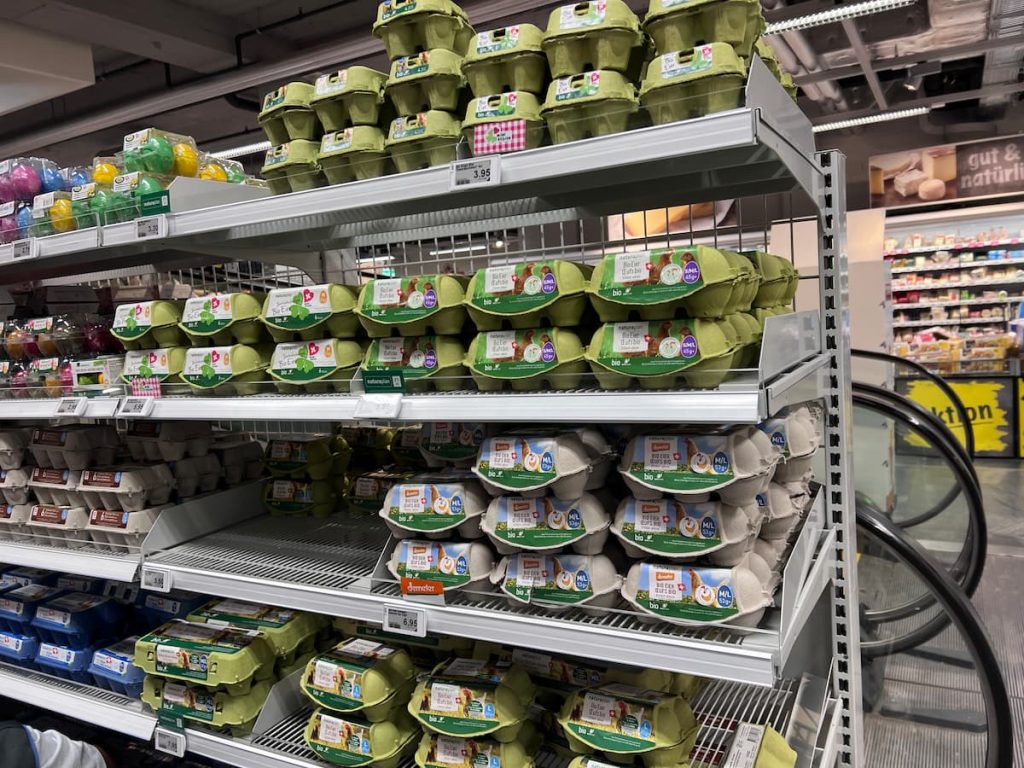
Many foreigners are surprised to learn that eggs are not refrigerated in Swiss supermarkets.
Because of the way eggs are processed and handled here, they’re stored at room temperature, which is entirely safe and common practice across much of Europe.
So, don’t go hunting for the eggs in the refrigerator area, they are located somewhere in the grocery section – just ask if you can’t find them – they are called “eye-r” in German (or just make like a chicken and they will get the picture :>)
Milk
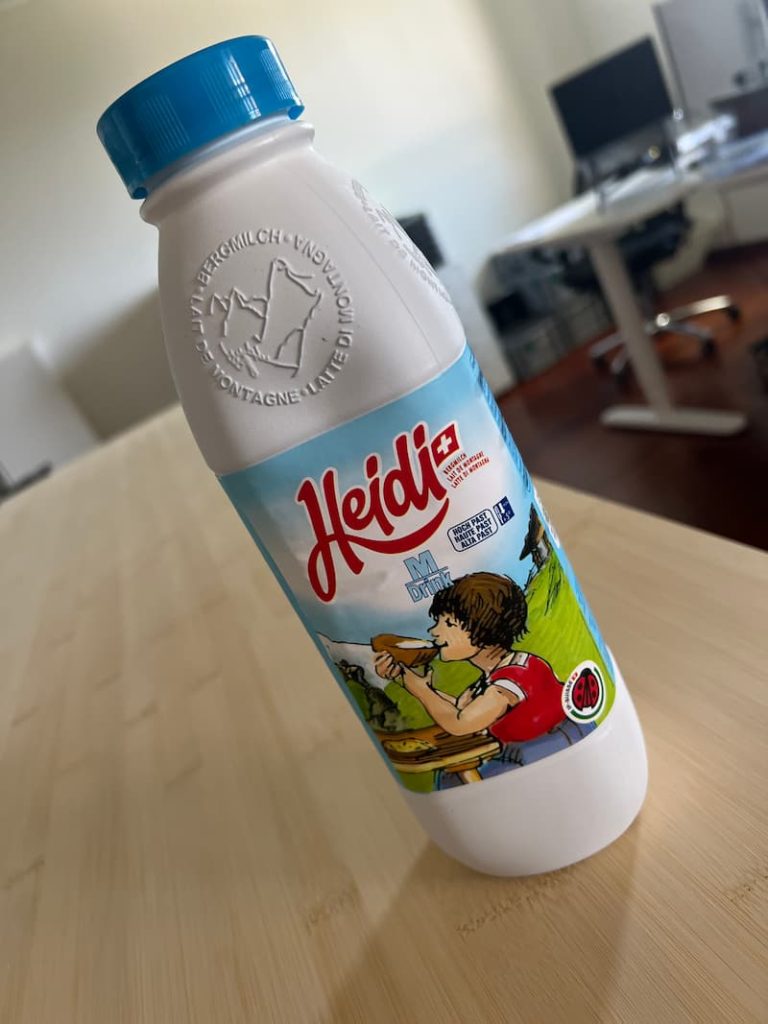
Many of you might want to pick up a bottle or two of milk while in the supermarket. But there are a couple of things you should be aware of.
There are two main types of milk in Switzerland, and they probably correspond (more or less) to something you are used to at home:
- DRINK (usually lighter blue text) – this is lower-fat milk
- VOLLMILK (Full milk in English – usually a dark blue OR red text) – this is full-fat milk
The Swiss mainly consume refrigerated milk in 1-2 (1/4-1/2 gallon) bottles. However, if you don’t have a fridge in your accommodation, you can also pick up UHT milk on the shelves.
Recycling

Recycling is taken very seriously in Switzerland, and supermarkets play a central role.
Most have collection stations for PET bottles, batteries, and other unusual recyclables that you cannot recycle in the local communities (which generally do glass, paper/cardboard, and aluminium (yes, we add an extra “i” outside of the USA).
Even though there’s no deposit system on bottles, returning them is expected, and you’ll notice locals separating waste carefully. So, if you can participate in the local recycling, it is very much appreciated.
👉👉 Learn All About Recycling in Switzerland
Alcohol

If you want a few beers or a bottle of wine with your dinner, just be aware that Migros supermarkets do not sell alcohol. Migros is a cooperative at heart, and it has voted not to sell alcohol. Their shop, their rules.
You can still get some non-alcoholic beers, which are not bad if you ask me, but if you want the real thing, head to Coop (or Denner).
👉👉 Learn All About Swiss Beers
Common Words (For Things You Might Need)
There are a lot of confusing words you might have to read or ask/point to in order to shop in Switzerland, here is a quick guide to get you started.
🥖 Staples & Basics
- Brot – bread
- Brötchen – bread rolls
- Milch – milk
- Käse – cheese
- Butter – butter
- Joghurt – yogurt
- Eier – eggs
- Fleisch – meat
- Wurst – sausage / cold cuts
- Fisch – fish
- Salz – salt
- Zucker – sugar
- Mehl – flour
- Reis – rice
- Nudeln – pasta
- Öl – oil
- Essig – vinegar
- Wasser – water
- Saft – juice
- Kaffee – coffee
- Tee – tea
🍎 Fruit
- Apfel – apple
- Banane – banana
- Orange – orange
- Zitrone – lemon
- Trauben – grapes
- Birne – pear
- Pfirsich – peach
- Erdbeeren – strawberries
- Himbeeren – raspberries
- Blaubeeren – blueberries
- Kirschen – cherries
🥦 Vegetables
- Kartoffel – potato
- Tomate – tomato
- Gurke – cucumber
- Zwiebel – onion
- Knoblauch – garlic
- Karotte / Möhre – carrot
- Paprika – bell pepper
- Salat – lettuce
- Spinat – spinach
- Brokkoli – broccoli
- Blumenkohl – cauliflower
- Pilze – mushrooms
🛒 Supermarket Essentials
- Supermarkt – supermarket
- Einkaufswagen/wageli – shopping cart / trolley
- Einkaufskorb – shopping basket
- Regal – shelf / aisle
- Preis – price
- Rabatt – discount
- Aktion / Sonderangebot– discount / special deal
- Kassenzettel/Kassebon – receipt
💳 At the Checkout
- Kasse – checkout / till
- Bar – cash
- EC-Karte – debit card
- Kreditkarte – credit card
- Kassenbon – receipt
- Karte – card (for payment)
- Zahlen – to pay
- PIN eingeben – enter PIN
- Quittung – receipt
- Tacshe – bag
- Rückgeld – change
🔍 Helpful Words
- Bio – organic
- Frisch – fresh
- Gefroren / Tiefkühl – frozen
- Haltbar bis – best before
- Zutaten – ingredients
- Kasse – checkout
- Ausgang – exit
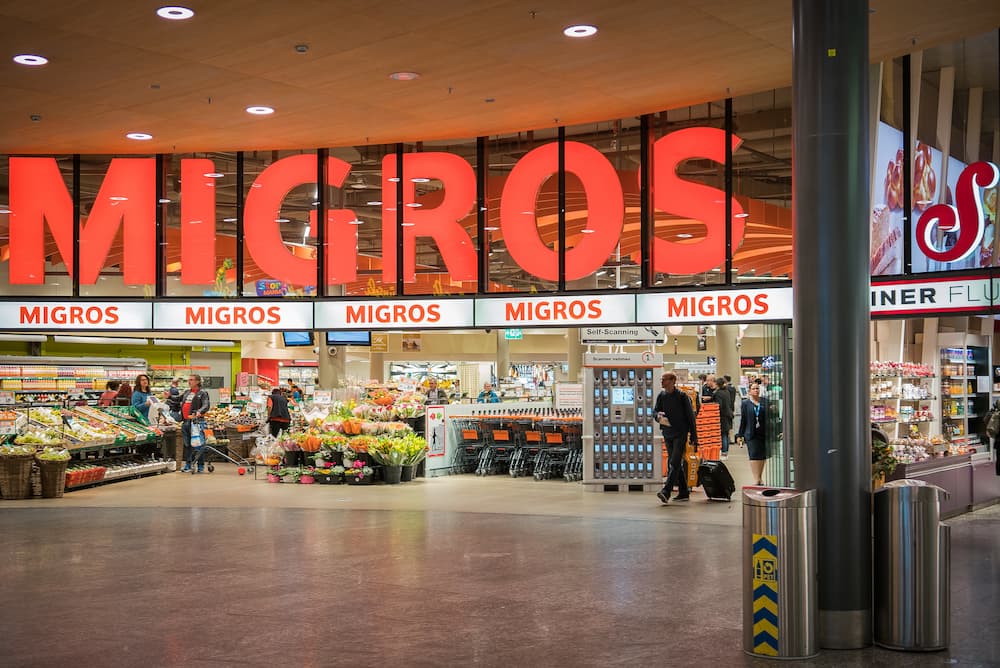
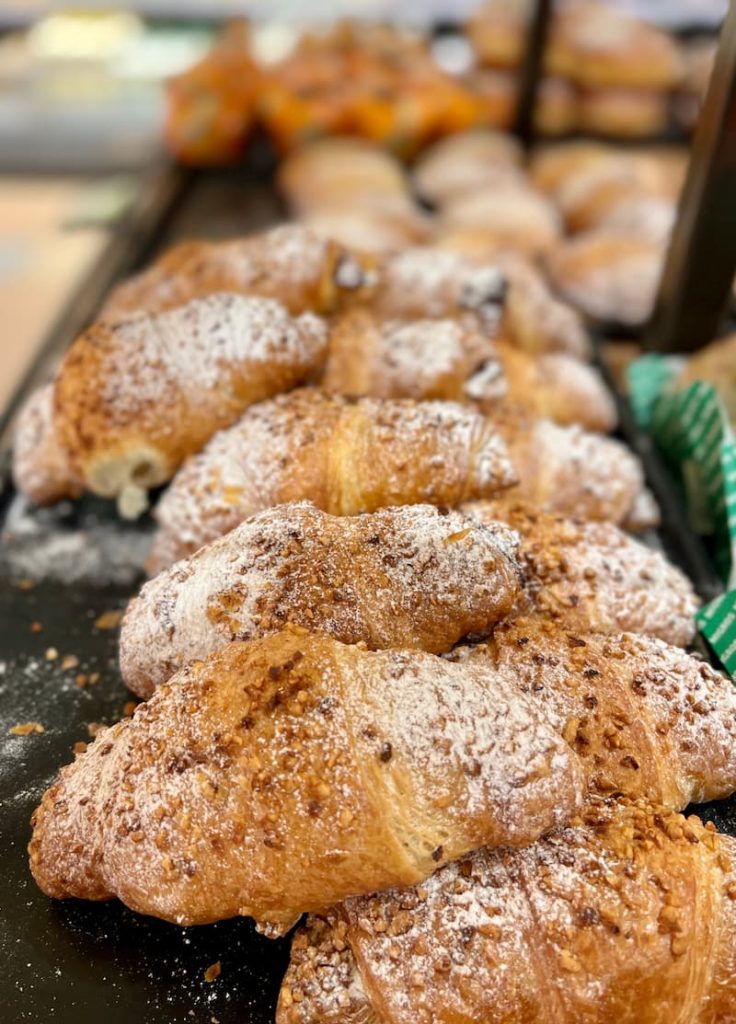
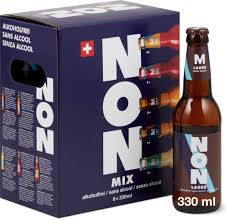


My friend and I are traveling to Switzerland at the end of September (24) to October (4). We were wondering about a Swiss pass for attractions; can we get them, does it save and how much do they cost?
We are planning on renting a car and driving the country. We will be using B & B’s and/or hotels for accommodations, any tips on that.
Thanks
Kathy
Excellent document. In Australia we often pack our own bags and have self check out BUT it was very handy to know what to expect when visiting a supermarket
glad it was helpful
Didn’t mention that but all types of vegetables and pulses available in Migros or coop. Better go to Asian shops to buy more options in pulses and vegetables
We traveled last November and found the people in the supermarket to be extremely helpful and patient with us while we tried to figure out how to price our fruits and vegetables. The food selection at Migros is magnificent, and my favorite part was their cheese selection. Can’t wait to visit again.
yes the cheese section is crazy indeed! you should go to a super large Migros, they are even more insane!
Self checkouts work in 4 languages. Migros English is good, Coop English not entirely translated from German.
A French version of this would be helpful 😉